How Tobacco Use Affects Erectile Health
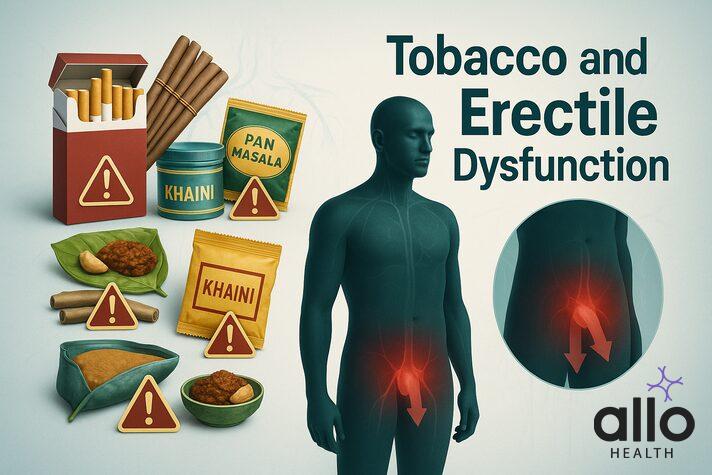
Tobacco, whether smoked or chewed, can cause erectile dysfunction. The nicotine and chemicals in tobacco narrow blood vessels, reduce nitric oxide, damage nerves, and lower testosterone, all of which make it harder to achieve and maintain an erection. Scientific research confirms that both smoking and chewing tobacco increase ED risk, and there’s no safe level of use. ED treatments like Viagra or Cialis may still help, but they work best once blood flow is restored, which is why doctors strongly recommend quitting tobacco first. Quitting tobacco can significantly improve erections, though recovery may take weeks to months, depending on the extent of damage. Healthy lifestyle changes, stress management, and medical guidance further increase the chances of regaining sexual performance and confidence.
Tobacco use can cause erectile dysfunction. Tobacco contains nicotine and other harmful chemicals that can damage blood vessels. It can also interfere with the hormones needed for healthy sexual function. This leads to decreased sex drive and reduced blood flow to the penis, making it harder to achieve or maintain erections.
Let’s break down the reasons and solutions to this problem in this article.
How do Erections Work?
Before we explain how tobacco leads to erectile dysfunction, let’s first look at how a normal erection works. The penis has two sponge-like chambers (corpora cavernosa) surrounded by a tough outer layer (tunica albuginea).
When you feel aroused, your brain sends signals through the nerves, telling the muscles (smooth muscles) inside these chambers to relax. This relaxation allows the blood vessels (penile arterioles) to widen, allowing blood to flow in and fill the erectile tissue. As the chambers expand with blood, they press against nearby veins, creating a natural seal that helps keep the erection firm.
This whole process is guided by the nervous system, which releases a chemical called nitric oxide (NO). This chemical helps by relaxing the smooth muscle, making erections possible.
In simpler words, an erection is teamwork between your brain, nerves, blood vessels, and hormones. [1]
If any step in this chain is disrupted, it can lead to erectile dysfunction (ED).
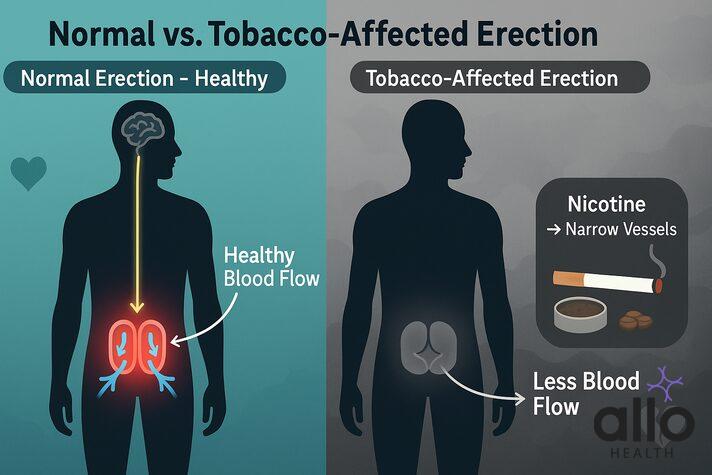
How does Tobacco Cause Erectile Dysfunction?
Tobacco contains nicotine and many other harmful chemicals like cadmium and arsenic (heavy metals). When you place it in your mouth, nicotine and other chemicals are absorbed into the blood and quickly spread throughout your body. It then affects various systems that help gain or maintain an erection.
Tobacco contributes to erectile dysfunction in several ways:
Poor Blood Flow
Nicotine[2] causes blood vessels to narrow. This reduces blood flow to the penis, which makes it harder to get or keep an erection.
Blood Vessel Damage
The endothelium is the inner lining of your blood vessels. It releases a chemical called nitric oxide. Nitric oxide helps blood vessels relax and dilate. Nicotine harms endothelial function. This limits blood flow to the penis. With long-term nicotine use, the blood vessels start to stiffen and lose flexibility (vascular injury). This also reduces the blood flow to the penis.
Effect on Cardiovascular Health
Nicotine causes your body to release adrenaline. This is the same hormone that helps you react in stressful or dangerous situations. This leads to an increase in heart rate and blood pressure. This makes it much harder for blood to flow smoothly to the penis. Over time, this added strain on the cardiovascular system [3] can lead to reduced blood circulation.
Effect on the Nervous System
The nervous system plays a central role in arousal and erectile health. Tobacco disrupts this by:
- Damaging nerves in the penis involved in arousal.
- Increasing stress hormones like adrenaline and cortisol. These interfere with the relaxation needed for erections.
Hormone Changes
Some studies suggest that regular tobacco users may have lower testosterone, a hormone linked to sex drive. Nicotine causes an increase in cortisol, the stress hormone. This blocks testosterone production even more. Cadmium, a heavy metal in chewable tobacco, has been linked to suppressing testosterone levels.
Psychological Factors
Anxiety, stress, or low mood from nicotine addiction can lower sex drive. This psychological distress may also make it harder to maintain sexual arousal.
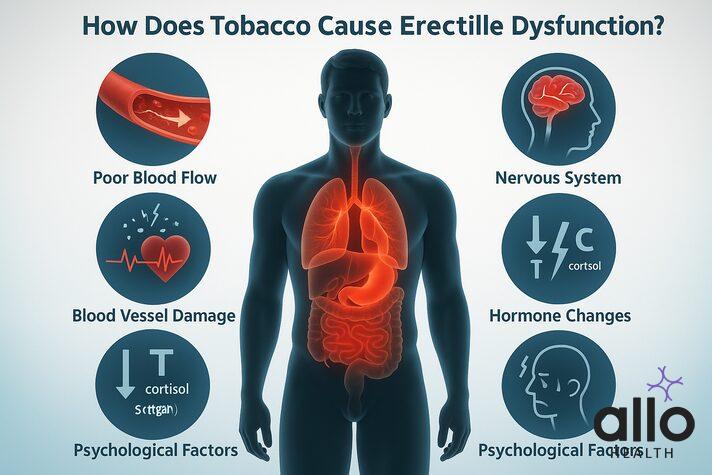
What type of Tobacco can cause ED?
The truth is, no matter how you take it, tobacco can interfere with healthy erections. Each type affects the body differently.
Here’s a simple table comparing the different types of tobacco and how they impact erections:
|
Types |
Impact | Effect on Sexual Health |
Other Health Concerns |
|
Cigarettes |
Narrows blood vessels, reduces nitric oxide |
Weak erections |
|
|
Bidis (Beedis) |
Higher nicotine per puff |
Severe vessel damage |
|
|
Chewing Tobacco |
Hormonal imbalance |
Reduced sex drive |
|
|
Snuff / Dip |
Nicotine is absorbed quickly, disrupts testosterone |
Weak erections |
|
|
Hookah |
Large amounts of carbon monoxide |
Low oxygen supply reduces erection quality |
|
Does Chewing Tobacco cause Erectile Dysfunction?
Yes, chewing tobacco causes erectile dysfunction. Many people believe that chewing tobacco is a “safer” option than smoking. After all, it doesn’t involve inhaling smoke into the lungs. But the truth is, it can be just as harmful, especially when it comes to erections.
Some examples of chewing tobacco used in India are:
(i) Tobacco-leaf: khaini, zarda, kiwam, gundi, and betel quid with tobacco.
(ii) Areca nut mixtures for chewing: pan masala, gutka, Manipuri tobacco, mawa, and dohra.
Chewing tobacco isn’t just dried leaves. Apart from nicotine, it contains over 30 cancer-causing chemicals and more than 3,000 toxic compounds. On top of that, you’re chewing on heavy metals like lead, arsenic, and cadmium (yes, the same poisons found in rat killer and batteries). Chemicals like formaldehyde (used to preserve dead bodies) and acetaldehyde damage your DNA, while sand and dirt grind down your gums and teeth, creating open wounds where these toxins can seep in. In short, every chew delivers a cocktail of thousands of poisons that wreck your mouth, blood vessels, and sexual health.
Users across forums have noticed a drop in sexual performance due to chronic use of different forms of chewing tobacco. [4]
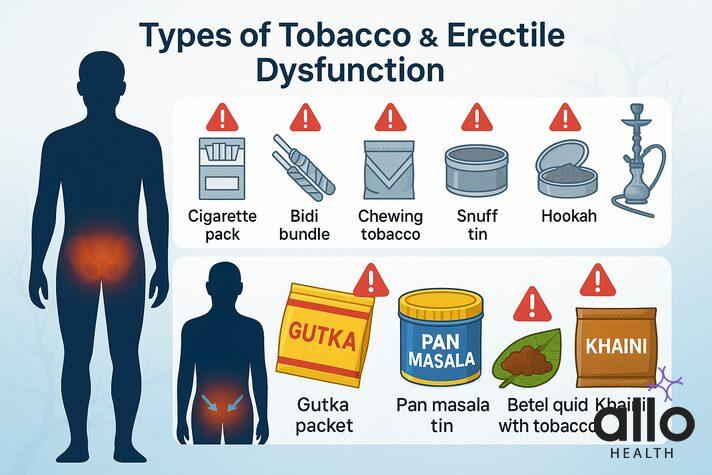
Can ED Be Treated Without Quitting Tobacco?
It is difficult to treat ED while you’re using tobacco. Medications like Viagra (sildenafil) and Cialis (tadalafil) are commonly prescribed for erectile dysfunction. They work by improving blood flow to the penis. However, if you’re still using tobacco, their effectiveness may be significantly reduced. Here’s why:
- Poor blood flow: Tobacco damages and narrows blood vessels, and affects circulation.
- Weaker results: These pills need healthy nitric oxide from blood vessels to work properly. Tobacco lowers nitric oxide, so the effect is reduced.
- More health risks: Tobacco users often have heart problems, high blood pressure, or diabetes. Combining ED pills with heart medicines like nitrates can be dangerous and may cause a sudden drop in blood pressure.
- Stress factor: Even if the medicine helps the body, nicotine addiction and stress can still affect sexual performance.
“According to Allo Health’s internal clinical data, about 1 in every 8 patients experienced erectile dysfunction linked to tobacco use. These insights are based on our analysis of more than 2.5 lakh patients who have visited our clinics.”
Can Quitting Tobacco Help ED?
As mentioned above, ED can not be treated if you are still using tobacco, as the medicines don’t work effectively. Quitting tobacco can make a real difference for both your sexual and overall health. [5]
How Long After Quitting Does ED Improve?
Recovery doesn’t happen overnight.
- Some men notice improvements in erection quality within a few weeks to months.
- For others, it may take six months to a year (or longer), depending on the severity of ED, how long they’ve used tobacco, and their health.
I always tell my patients, it’s never too late to quit. Even if you’ve been using tobacco for years, stopping now can help to improve your erections over time.
Recovering from ED caused by Tobacco
Quitting tobacco is a powerful first step, but it’s not the only thing that can help restore sexual health. Think of it as part of a bigger journey. Here are some strategies that can complement your decision to quit:
1. Embrace Healthy Living
Your lifestyle habits directly affect your erections. Eating a balanced diet rich in fruits, vegetables, whole grains, and lean proteins supports good circulation and hormone balance. Regular physical activity improves blood flow, stamina, and confidence. Limiting alcohol can also give your sexual health a major boost.
2. Care for Your Mental Health
ED isn’t always just physical. Stress, anxiety, and depression can worsen the problem. Practicing mindfulness, trying yoga, or speaking with a therapist can reduce mental strain and help break the cycle of performance anxiety.
3. Consult a Healthcare Professional
Nicotine replacement therapy (NRT), such as nicotine gum and nicotine patches, can make it easier to quit tobacco and reduce cravings [6]. If ED continues despite quitting and lifestyle changes, don’t hesitate to talk to a doctor. They can check for underlying causes and recommend treatments and ED solutions.
4. Open Conversation with Your Partner
ED can feel isolating. Being honest with your partner about what you’re experiencing can relieve pressure. It can strengthen intimacy and build mutual support as you work through recovery.
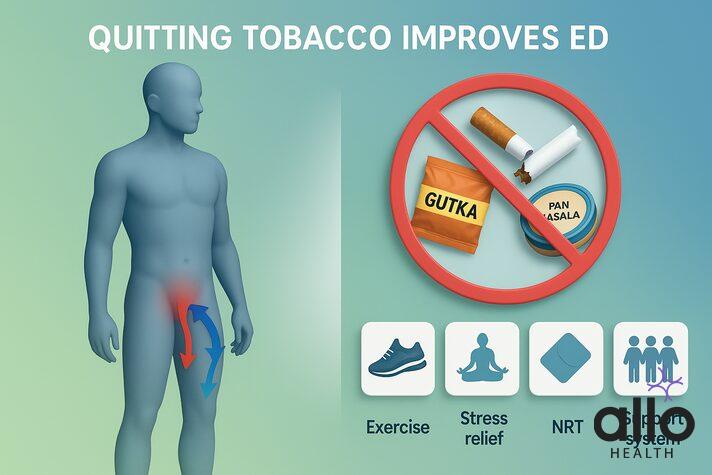
Conclusion
Tobacco use has a clear and damaging impact on erectile health. It increases the risk of erectile dysfunction by narrowing blood vessels. It can disrupt hormones and strain the nervous system. All this can also make ED treatment less effective.
The good news is that ED caused or worsened by tobacco is reversible. Quitting tobacco allows your body to begin repairing itself. Pairing this step with healthy lifestyle habits, stress management, and professional medical care can speed up recovery.
Everyone’s body heals differently. The key is patience. Remember that every tobacco-free day is a step toward better reproductive health.
"The following blog article provides general information and insights on various topics. However, it is important to note that the information presented is not intended as professional advice in any specific field or area. The content of this blog is for general educational and informational purposes only.
Book consultation
The content should not be interpreted as endorsement, recommendation, or guarantee of any product, service, or information mentioned. Readers are solely responsible for the decisions and actions they take based on the information provided in this blog. It is essential to exercise individual judgment, critical thinking, and personal responsibility when applying or implementing any information or suggestions discussed in the blog."






